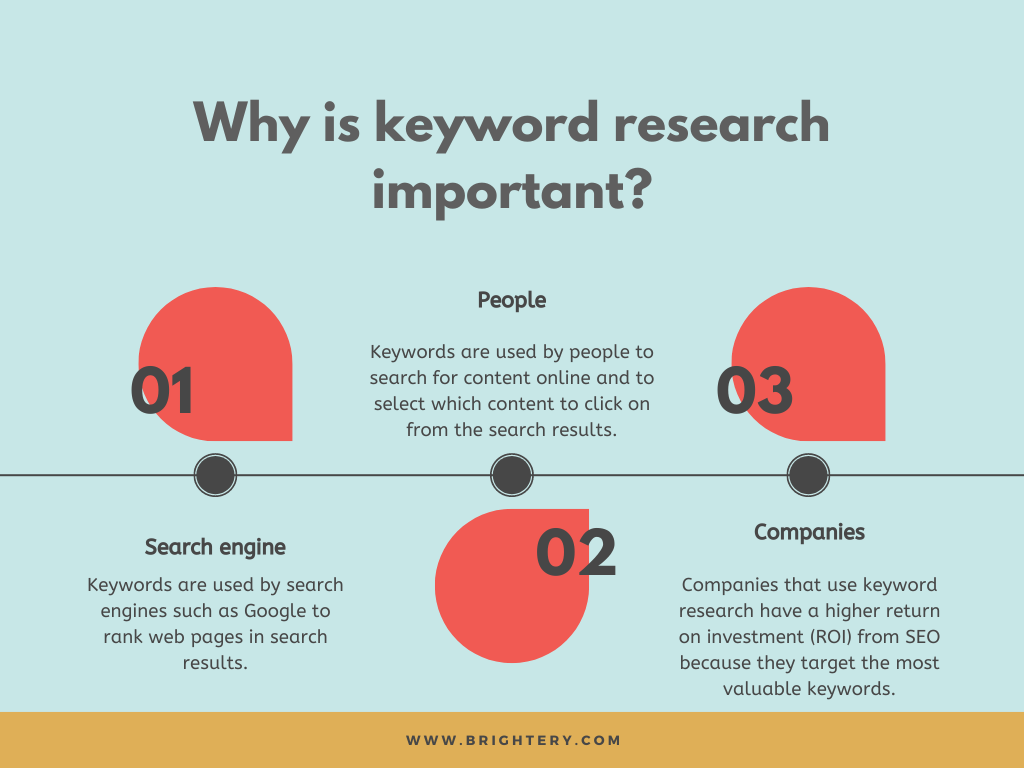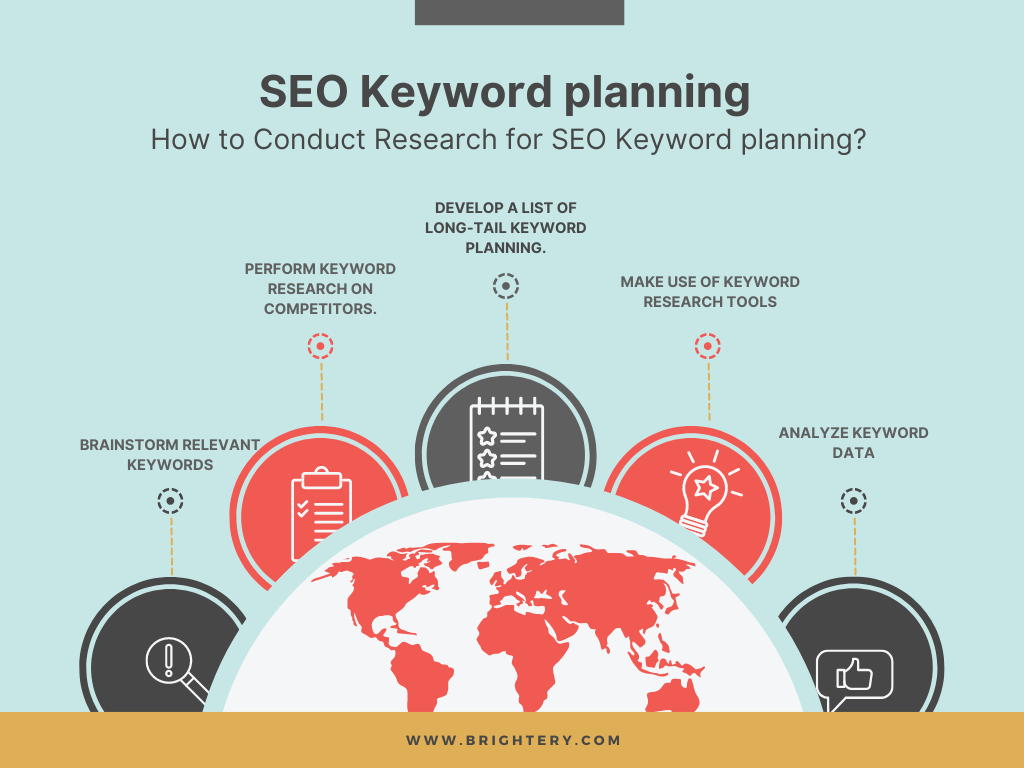
Keywords, Keyword research and everything about it
Keyword research is key to search engine optimization (SEO), thus every business that invests in SEO should understand how to do keyword research. This guide will show you how to find the ideal SEO keywords so that your business could maximize the performance (and return) of SEO.
What is Keyword research?
Keyword research is the process of finding, analyzing, and selecting search phrases that people use to create results on search engines for SEO. SEO uses keywords to help search engines appropriately rank pages in search results and to assist users in understanding the context of a page.

Why is keyword research important?
Keyword study is essential for SEO for several reasons, including:

Search engine
Keywords are used by search engines such as Google to rank web pages in search results.
A blog article with the phrase "best travel bags" in the title tag and a list of the best travel bags informs search engines that it is a relevant page to show for searches with that keyword.
People
Keywords are used by people to search for content online and to select which content to click on from the search results.
Someone seeking a list of the greatest travel bags, for example, is more likely to click on a round-up blog article than a product page.
Companies
Companies that use keyword research have a higher return on investment (ROI) from SEO because they target the most valuable keywords.
A company that does SEO keyword research, for example, may concentrate on long-tail, low-competition keywords.
When you understand keyword research, you could make data-driven decisions regarding your SEO strategy. Rather than guessing what your target market searches for, you know what keywords they use to identify businesses like yours and then use those keywords on your site.

How to Conduct Research for SEO Keyword planning?
You realize why SEO keyword research is crucial, but how do you start the keyword research process? Continue reading to learn how to research keywords for SEO using the eight methods listed below:
Brainstorm relevant keywords
The first step in keyword research is to generate a list of potential keywords to make keyword planning. These SEO keyword research can be as wide or as specific as you like, as long as they connect to your business, products, or services.
Location-based keywords are words and phrases that identify your state, city, region, or other terms that searchers may use to describe your area.
Perform keyword research on competitors.
Then, you can go to your competitor's websites and see what SEO keyword research they're using to describe similar products and services to yours.
Researching your competition may be a terrific method to generate ideas that you might not have thought of otherwise, and it can help to guide the remainder of your keyword research later on.
Develop a list of long-tail keyword planning.
Once you have your basic list, you may expand it into a long list of long-tail keywords.
So the keywords you come up with in step one might be quite short and generic, such as bike stores.
But, if you think about it, there might be hundreds, if not tens of thousands, of businesses throughout the country competing for that identical keyword, and as a local business, you're unlikely to appear in the top ten.
So, at this step of the SEO keyword research process, you want to identify longer, more detailed keywords that show that a user is especially seeking the items you provide.
While you may rely on Google's suggested searches, this method is time-consuming because it is manual.
That is why we frequently advise employing a keyword research tool.
Make use of keyword research tools
The Keyword "Brightery", for example, will broaden your keywords depending on actual user search trends and statistics.
When you enter a term into Keyword "Brightery", you'll obtain an alphabetized list of all the versions that Google users commonly look for.
As you scroll down the page, you'll notice a lot of various results for this, and depending on the phrase you input, it may be an overwhelming list of terms.
Make a note of the ones that are important to your business, or just export them to a spreadsheet.
You may repeat this procedure for each of the keyword planning in your original list, and at this stage, you may have several thousand potential keyword planning suggestions for your website.
However, in the next stage, we'll go through what to do with all of those keywords and how to limit them to obtain the keywords that will produce the greatest results for your SEO plan.
Analyze keyword data
- You'll get a few stats for each term after uploading your list.
- The two most crucial are search volume and CPC (cost-per-click).
- The search volume reflects how many users search for each term each month.
- The greater the search volume, the greater the interest in that certain keyword.
The cost-per-click is then data from Google Advertisements or Google Ads that reflects how many advertisers are attempting to place ads for that term.
The higher the cost-per-click, the more challenging ranking for that term will be for your company.
When discussing how to identify keywords, the ideal keyword would be one with a large monthly search volume yet a low cost-per-click. This suggests that many visitors are looking for this information, but few websites are attempting to rank for it.
Rank your keywords by importance.
Once you have a list of keywords, you can decide where you want to use them on your website.
If you discovered keywords for which there are existing pages, you may include these keywords in your title tags, header tags, meta descriptions, and other key HMTL components, as well as the body content on each of these pages.
That being said, you should avoid keyword stuffing and inserting keywords where they aren't relevant or required.
All of the material on your site should be produced with your users in mind, with the objective of enlightening and assisting potential consumers in finding the information they require.
During the keyword research process, you may have discovered a few keywords for which you do not yet have material on your site; however, rather than adding these keywords to random pages with the goal that those pages would rank for the keywords, you should use this as a chance to develop more content for your site and more pages that will serve your consumers.
Make keyword research a constant process.
As you improve your site, you may conduct as much keyword research as you need.
This can help you uncover even more keywords that are useful to your clients and maintain your keywords relevant to shifting search traffic and trends over time.
What Are SEO Keywords?
Keywords for SEO, also known as SEO keywords, are phrases or words that people use to get results on search engines. Including SEO keywords in online content can assist enhance relevance, search ranks, and organic traffic.
Today's consumers rely on the Internet to help them locate the products and services they require. This means that if you want them to become clients, your company's website must appear in search engine results for the keywords and phrases they're looking for.
This does not occur by chance. It's the end result of a procedure known as search engine optimization or SEO. You've obviously come across the phrase "keywords" in a lot of your research if you're new to SEO and want to use it to attract new clients.
Why are keywords important?
Many things influence your site's potential to rank highly, but keywords help search engines in understanding what each page on your website is about.
Keywords help search engines in displaying the relevant sites for certain searches and ensuring that they are providing their users with the data they want.
This means that one of the primary goals of SEO is to find the keywords that your potential customers use when looking for your products or services, then create content that targets the search intent behind those keywords and use those keywords in the appropriate parts of your site.
What are SEO keywords?
Keywords for SEO are words or phrases used in your web content which help users reach your website via search engines like Google. Optimizing your website with SEO keywords (and following Seo strategies) will help you bring more visitors and traffic to your website.
What are the different sorts of SEO keywords?
There are two types of SEO keywords to be aware of short-tail and long-tail.
Short tail keywords
Short tail keywords are those that contain only one or two words.
For example, "Travel" is a short-term term.
These keywords have a high search volume, which means that many people look for them each month.
This may appear to be a beneficial thing if you're attempting to choose keywords for your website.
After all, you want your company to be seen by as many people as possible, right?
Furthermore, short-tail keywords have a high level of competition, making it tough to rank highly for them.
This is certainly relevant if you are just getting started with a website that will compete with businesses that have been optimising their sites for years.
As a result, short-tail keywords aren't a recommended term for SEO, at least for organisations just starting out.
In comparison, a business that has been using SEO for years may target short-tail keywords without fear.
Long tail keywords
Long tail keywords, on the other hand, can include three to ten words, and sometimes even more.
In the same line, a long tail keyword may be "best travel agencies in the United States."
These keywords have a lower search volume but far less competition.
This implies that, despite the fact that fewer individuals search for them each month, you have a significantly higher chance of reaching them.
Furthermore, long-tail keywords have a much clearer purpose than short-tail keywords.
For example, if you were trying to rank for the word "Travel," it would be very hard to identify what information your visitors were seeking and deliver it. However, if you wanted to attract people who were looking for the "best travel agencies in the United States," you'd know just what to cover on that page.
How to Choose Seo Keyword Planning That Drive Traffic?
You're probably wondering how to pick SEO keywords now that you know what they are. Fortunately, there are several tools available to assist you in finding the ideal keywords for SEO, as well as effective methods for keyword marketing.
Use keyword research tools to reach SEO keyword planning
Keyword selection should never be based on guessing, and there are several internet tools available to help you find the finest potential possibilities for your business.
If you run pay-per-click (PPC) campaigns using Google Ads, one of the strongest solutions is Google's Keyword Planner, which gets data directly from Google Ads.
It offers precise statistics on the search volume and degree of competition for each keyword.
It also suggests keywords depending on the content existing on your site, which is an excellent place to begin when researching keywords.
If you don't have any ongoing Google Ads campaigns, or if you just wish to explore outside Google, there are various additional keyword research tools to consider. While some are costly, there are free solutions for finding SEO keywords.
Concentrate on long-tail keywords
Long tail keywords should be prioritized when you explore potential SEO keyword planning for your site.
Although you may choose a few shorter keywords (particularly branded keywords like your brand) for your homepage and other company-specific pages, finding long tail keywords should be your major focus.
Here are a few examples of free tools:
- Keyword Tool
- Answer the Public
To identify the ideal SEO keywords for your website, feel free to use a mix of these tools.
Look for high-volume, low-competition keywords.
Personal injury attorney keyword suggestions
Although long-tail keywords often have low competition, you should still examine the volume and competition of each when conducting your study.
Certain sectors are more competitive than others, and ranking for long-tail keywords might be difficult.
This is especially true if your organisation operates in the legal, insurance, drug and alcohol rehabilitation, or online education sectors.
Regardless of your industry, it's important to think about how tough it will be to rank for any specific term. If you have little possibility of ranking for a given keyword, optimising a page for it is a waste of time.
Instead, concentrate your study on keywords that have a high chance of ranking and driving traffic to your site. If you're new to keyword research, this guide on selecting excellent keywords is a great place to start.
How to Use SEO Keywords on Your Website?
You'll need to use your keywords across your site once you've chosen them. As a general guideline, it's ideal to concentrate on one keyword on each page. This allows the search engines to quickly determine the main topic or subject of any given page and provide it as a result for targeted keywords.
Begin using SEO keywords on your website by placing them in the following places:
Your URLs
First, verify that all of your URLs are SEO-friendly. If they aren't, redesign your URL structure, include relevant keywords in your fresh URLs, and set up 301 redirects for previous sites you wish to update.
Your meta tags
Then, much like your title and header tags, incorporate keywords in your meta tags.
Each title tag should be precisely what it says: a page title.
Heading tags are subheadings that separate parts or concepts on a page.
These not only tell search engines what your website is about but also let users quickly find the information they need.
Your content
Then, go through each page and make sure the target term appears organically a few times - the essential word here being naturally.
Keyword stuffing occurs when you include your keyword in locations that are irrelevant or make no sense.
Keyword stuffing violates all major search engine criteria and will result in a penalty that will prohibit your site from appearing in search engine results.
Furthermore, keyword-stuffed websites rarely make sense or give value to your visitors.
Instead, use the keyword for each page just where it makes sense - and if it doesn't make sense elsewhere, it's not the proper keyword for that page.
Use your SEO keyword in your first paragraph for the greatest results.
Your images
Despite the fact that search engines cannot "see" your images, they can "read" them.
As a result, you should optimise your photos for your SEO keyword. You may include your keyword in the filename and alt text of your image. Make sure your keyword is natural and makes sense if you use it in your alt text.
For reference, your alt text should accurately describe your image.
How to Use SEO Keywords for Content Marketing
As you research keywords connected to your business, products, and services, you'll come across several that highlight specific topics that your target audience wants to learn more about but aren't included on your site's existing pages.
These keywords will be highly beneficial to your content marketing strategy.
If you're not familiar with content marketing, it entails generating and releasing unique blog posts, article pages, infographics, videos, and other material that informs or entertains your target audience.
It's typically regarded as a different approach from SEO, but when you utilise the keywords identified during keyword research to drive your topic selection, you could be confident that you're providing the material that your potential consumers desire.
- Then you may optimise your content and perhaps rank for the keywords you've chosen.
- This method is particularly useful for long-tail keywords.
- After all, if someone is seeking for a certain keyword, they most likely know exactly what they're looking for.
- And if you want people to stay on your website, you must supply that information.
When you create unique content that answers your potential consumers' inquiries or solves a specific problem, you generate traffic to your site and increase brand awareness among people who come. Their first impression of your firm will be positive as long as the stuff you give is actually useful.
Even if these visitors aren't ready to buy or contact you on their initial visit to your site, they'll remember your brand when they are, which means the content you publish may have a direct influence on your revenue and profits.
Do you need help with SEO keywords?
We have years of expertise in developing successful SEO strategies for our clients at Brightery. An important part of the procedure is researching and picking effective SEO keywords for each of them and making SEO keywords planning to help your business.
When you work with us, we'll get to know your company and industry inside and out, and we'll conduct all of the necessary research to determine what your potential consumers want. To take your plan ahead, our skilled team will optimise your site for the finest potential keywords and develop fresh content.
Contact us now to talk with a strategist about how we can help your company use SEO to generate more traffic and consumers!

{{comments.length}} Comments
{{comment.name}} · {{comment.created}}
{{sc.name}} · {{sc.created}}
Post your comment